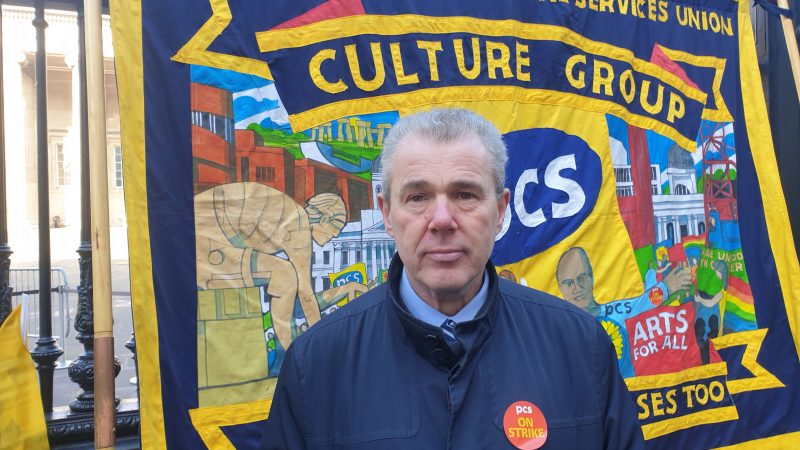"Strikes will grow and grow whilst the government maintain this attitude"

General Secretary of the Public and Commercial Services (PCS) union, Mark Serwotka, told LFF how the union will continue to use targeted strike action and mass strike days to intensify pressure on the government.
This week, 650 DWP workers are continuing their 20-day strike, whilst 60 DVLA workers, 340 members at the Animal and Plant Health Agency and 100 employees of the British Museum are taking extended periods of industrial action.
PCS have been using a system of targeted and sustained strike action across a series of consecutive days in the hope of building real pressure on the government, who have so far held firm in their refusal to negotiate on pay.
Serwotka joined the British Museum picket line today, where employees are seeking a 10% pay rise and an end to the long-running dispute over pay, pensions and redundancy terms.
“The action we’ve taken so far has been incredibly active”, said Serwotka. “It’s building sustained pressure over a period of time, which is then supported by mass action.”
He said: “Having represented some of the lowest paid people in the country, we knew people wanted to go on strike but were worried about how they could afford to.
“Our strategy is to have everyone out, losing pay but to make a mass message to take targeted, sustained action supported financially by the union so the pressure can build on the employers. We are doing that here this week.”
Whilst authorities in Scotland and Wales have recently joined the negotiating table over public sector pay, Serwotka noted the stark contrast with Westminster’s silence.
“Wherever the government is not directly in charge or pulling the strings, people have made better offers and in some cases, acceptable offers.
“It’s the Westminster government that is the problem and the pressure needs to build. This is a government in crisis.
“The more we see mass days like the 1st February and the 15th March, and people continue to take action across our public sector, it’s inevitable the government will have to compromise.
“They should do the right thing and do it now so we avoid all the disruption that will unfortunately happen if they continue to turn the other way.”
Serwotka, who joined the civil service in 1980 and worked as a Clerical Officer in a Social Security Office for 21 years, said he was ‘staggered’ by the financial situation for employees now.
Figures show 40,000 civil servants are currently using foodbanks whilst 45,000 are claiming benefits, including the people who administer them in job centres.
“I’ve never seen anything like it. The figures just for us are astonishing.
“We have a situation where 30% of HMRC staff are on the minimum wage, who never were before.
“It shows how pay has been massively suppressed over the last 10 years and that’s a real part of people’s grievances.
“They’ve got a cost of living crisis now but they’ve seen their real terms pay devalued enormously.”
Serwotka noted that their request of a 10% pay rise seemed ‘quite moderate’ now in comparison to claims coming in from other unions, and established room for negotiation.
“Our view is people deserve to match inflation as a minimum, but the main point we’ve made to the government is that if they put money on the table now, we will get into talks and discuss how much that is and how its distributed.
“The point at the moment is they are saying ‘not a penny more’ – whilst they maintain that attitude the strikes will grow and grow.”
Despite the government’s stance, Serwotka maintained confidence that they will win this dispute because, ‘people have had enough of the government’, adding it’s the most optimistic he has been in years.
“Everyday there is a strike like this people increasingly don’t blame the workers, but are more and more blaming the politicians.
“It’s Rishi Sunak and Jeremy Hunt who should take the blame, they’re the ones who need to do something about it.
“The government is on its last legs.
“They’ve got a choice here, either they sort out the mess they’ve created or they step aside.”
Hannah Davenport is trade union reporter at Left Foot Forward
Left Foot Forward’s trade union reporting is supported by the Barry Amiel and Norman Melburn Trust

Left Foot Forward doesn't have the backing of big business or billionaires. We rely on the kind and generous support of ordinary people like you.
You can support hard-hitting journalism that holds the right to account, provides a forum for debate among progressives, and covers the stories the rest of the media ignore. Donate today.



